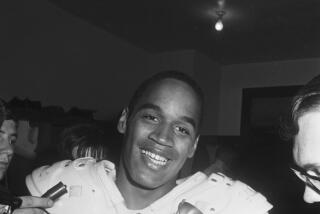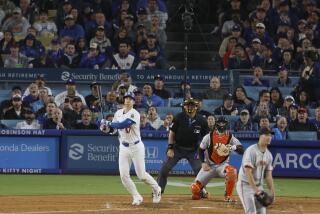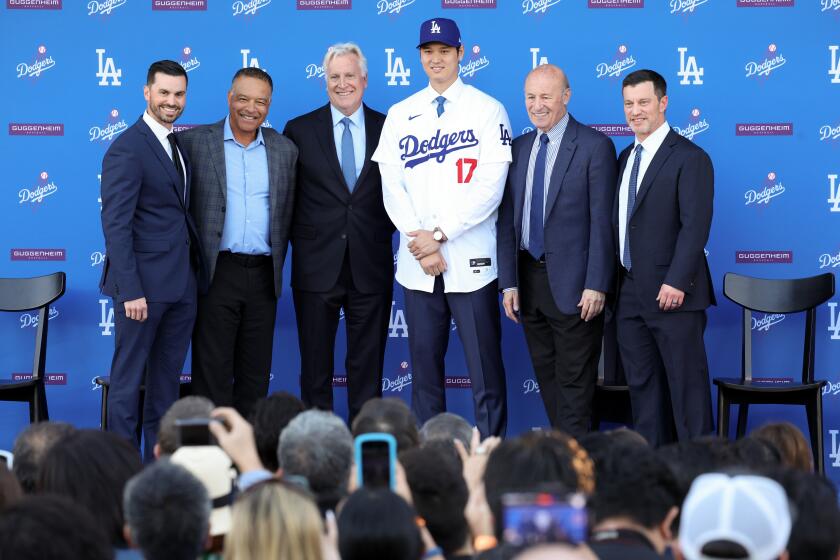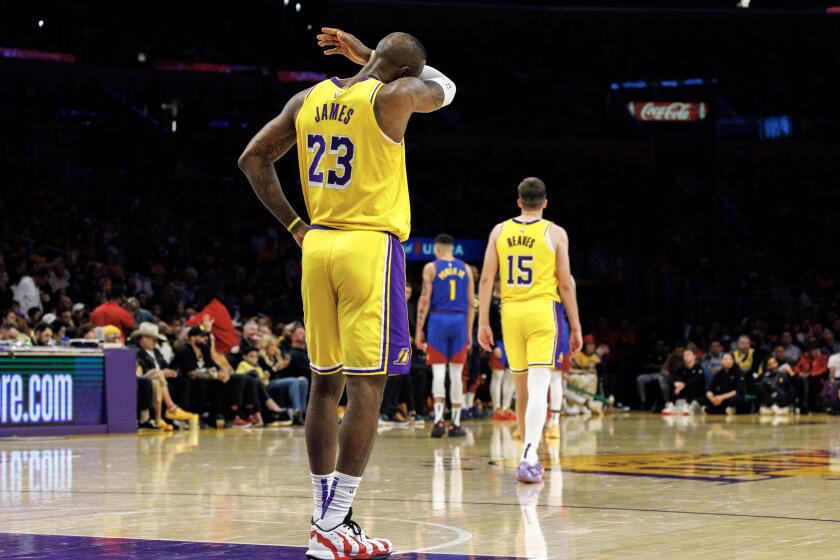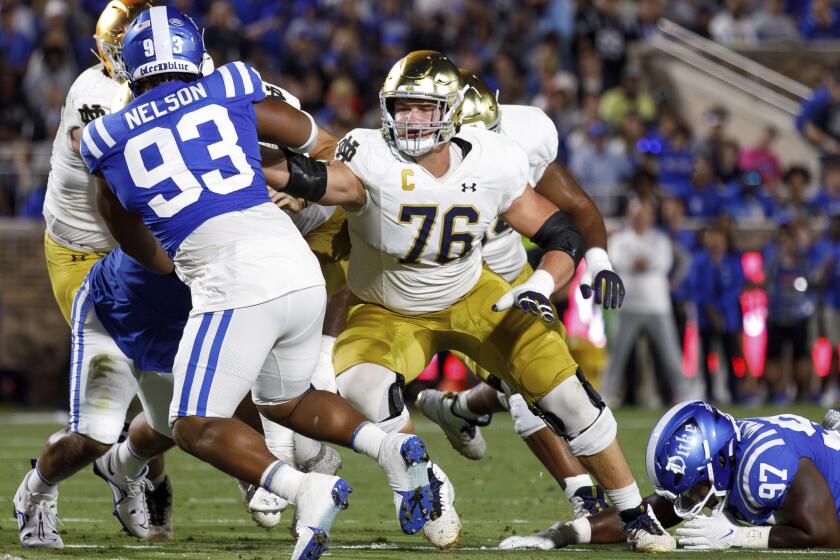D’oh! Homer Simpson is headed to Baseball’s Hall of Fame
As an animated character, Mike Scioscia will live forever.
This is not the kind of animation you see in his face when he goes jaw to jaw with an umpire. This is the animation that made him a cartoon catcher, in a beloved episode of “The Simpsons” that first aired 25 years ago and pays him residuals to this day.
“Sometimes, I’ll net 47 cents,” Scioscia said.
Scioscia, now the Angels’ manager and then the Dodgers’ catcher, was one of nine major league guest stars in “Homer at the Bat,” in which Homer Simpson’s boss at the Springfield nuclear power plant, Mr. Burns, recruits ringers for the company softball team.
The All-Star team included Ken Griffey Jr., Ozzie Smith, Wade Boggs, Roger Clemens, Darryl Strawberry, Jose Canseco, Don Mattingly and Steve Sax. The first three have been inducted into the National Baseball Hall of Fame, and Homer will join them there Saturday.
Sort of, anyway. Homer is getting inducted into the Hall of Fame in a ceremony that will launch a yearlong “Homer at the Bat” display in Cooperstown, in honor of the episode’s 25th anniversary. (Don’t tell Homer, but the plaque is not really bronze, and it goes away when the display does.)
“Baseball is recognized as our national pastime due to its wide intersection with American culture over the last two centuries, evident in literature, theater, language, art, music, film and television,” Hall President Jeff Idelson said in a statement. “ ‘The Simpsons’ is a perfect example of that connection to Americana.”
“The Simpsons” and Homer himself might be American cultural icons now, but the show had a rebellious feel to it then, with Homer’s wise-cracking son, Bart, portrayed as a young punk. Bart T-shirts were banned in some schools, and President George H.W. Bush opined, “We need a nation closer to ‘The Waltons’ than ‘The Simpsons.’ ”
In 2009, “The Simpsons” passed “Gunsmoke” to become the longest-running prime-time series in American television history.
“When it first came out, we were all drawn to ‘The Simpsons,’ ” Scioscia said. “We thought it was almost like an indie film. We followed them, we loved them, but we didn’t know how big they were going to become.
“Now they’ve become part of our culture. To sit back [and] think about the chance that I had to do two episodes, it’s really a kick.”
Scioscia returned to Springfield in 2010, in an episode in which Lisa Simpson was managing brother Bart’s baseball team. That episode’s other guest star was Bill James, the patron saint of statistical analysis, who said: “I made baseball as much fun as doing your taxes.”
In “Homer at the Bat” — a decade before “Moneyball” — the show foretold the analytical revolution when Homer pinch-hit for Strawberry with the game on the line, even though Strawberry had hit nine home runs that day. The opposing pitcher threw left-handed, Homer batted right-handed and, as Mr. Burns explained to Strawberry, “It’s called playing the percentages. It’s what smart managers do to win ballgames.”
In 2005, as he crusaded to curb baseball’s steroid abuse, former Commissioner Bud Selig said he wished he “knew in 1995 what I know now.” But 1995 came seven years after Washington Post columnist Tom Boswell cited players who called steroids a “Jose Canseco milkshake,” and three years after “Homer at the Bat,” in which Griffey’s head swelled grotesquely after taking some of the purple liquid Mr. Burns provided to his players. “Brain and nerve tonic, rich in proteins and electromagnetic juices,” Mr. Burns said.
Griffey’s cranial deformation was one of the cruel fates that befell almost all the major league stars in the episode. Scioscia suffered radiation poisoning, described in the episode’s closing song as “Mike Scioscia’s tragic illness.”
Fifteen years later, Mike Petriello — now an MLB Network analyst — got his start in baseball as proprietor of a Dodgers blog called “Mike Scioscia’s Tragic Illness.”
Scioscia is not in the Hall of Fame. Neither is Clemens, Strawberry, Canseco, Mattingly or Sax.
But Homer will be. After all, in the Springfield city championship game, he had the walk-off hit — the walk-off hit-by-pitch, that is.
“Hey, he was clutch,” Scioscia said. “He got hit with that pitch. I think the Hall of Fame voters respect when hitters are clutch.”
Follow Bill Shaikin on Twitter @BillShaikin
More to Read
Get our high school sports newsletter
Prep Rally is devoted to the SoCal high school sports experience, bringing you scores, stories and a behind-the-scenes look at what makes prep sports so popular.
You may occasionally receive promotional content from the Los Angeles Times.


